by Johanna Lee and Harry Yoon
2012 CAAM Fellows
The Present/Future Summit (March 11) brought together Asian Americans from all corners of media to confront the present and future of Asian Americans onscreen and online. We had such a lively discussion afterwards, that we thought it would be fun to jot down some of our exchange as an informal Q&A with one another.
Check out these interviews with CAAM Fellows Johanna Lee (participating as a television writer) and Harry Yoon (participating as a featured film editor)!
RESPONSES FROM JOHANNA LEE (TV writer):
What did you take away from the conference?
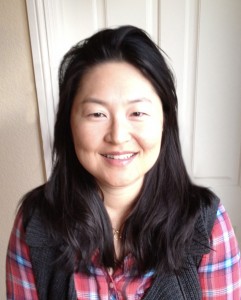 I’d been aware of the new directions in online video for a while but I was wondering how people are monetizing it. One thing that I didn’t realize, was that people were making money through merchandising. Also, I was reminded how much these videos are driven by a “cult of personality” for their appeal. The summit prompted me to watch a lot of YouTube when I got home and I was again struck by what I saw. A lot of these YouTube stars were young men. They are good-looking, entertaining, Asian men and we’re not getting that on television. It makes sense that there’s a huge audience of Asian Americans watching these stars because they are finding faces they don’t see elsewhere. It’s not like there are a ton of people tuning into YouTube clips of 80 year-olds talking about politics.
I’d been aware of the new directions in online video for a while but I was wondering how people are monetizing it. One thing that I didn’t realize, was that people were making money through merchandising. Also, I was reminded how much these videos are driven by a “cult of personality” for their appeal. The summit prompted me to watch a lot of YouTube when I got home and I was again struck by what I saw. A lot of these YouTube stars were young men. They are good-looking, entertaining, Asian men and we’re not getting that on television. It makes sense that there’s a huge audience of Asian Americans watching these stars because they are finding faces they don’t see elsewhere. It’s not like there are a ton of people tuning into YouTube clips of 80 year-olds talking about politics.
Is there any way that this conference made you think about what you want to do with your career writing for television?
It made me come home and ask my animator husband about why we weren’t creating a web series! That said, Quan Phung talked about how in a longer format like an hour-long drama on television, you have more time to explore stories and character arcs, and that really appeals to me. At the end of the day, for me, it’s the content. I think there’s a lot of people tuning into some of the shorter content online because there are characters and subject matter that’s not being represented via traditional television. There may be stories that I want to tell that are perfect for shorter work online, and there are stories that are more suited for TV. So my desire to work in television hasn’t changed, but I could see myself also creating web series and shorter work in addition to what I am doing now.
See Quan Phung speak at Present/Future
(Our discussion led us to the topic of comedian Louis C.K.’s enormously successful self-funded release of his “Live at the Beacon Theater” concert video online.)
For me, the reason I bought the show was that I knew his work and loved it. He’s one of the only comedians out there that’s doing material on the down and dirty details of raising kids at his age and it’s hilarious. I also think that his price point was key. I thought for five bucks, that’s an easy decision. If it was twenty dollars, I wouldn’t have done it. Finally, I think Louis was successful because he’d already had two shows on major networks along with a long stand-up career. He didn’t just come out of nowhere.

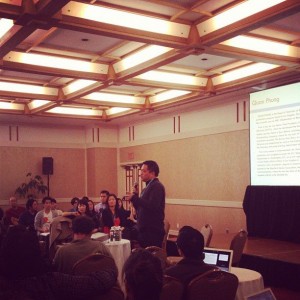
Pictured: (Karin Chien, Quan Phung) Photos by: Jain Thapa.
RESPONSES FROM HARRY YOON (feature film editor)
What did you take away from the conference?
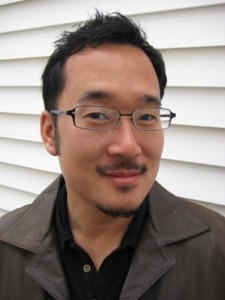 As someone who works primarily in feature films, it was a little ominous to be reminded that the audience for features might be disappearing, and that next generation audiences are watching content in general, online. I mean, I stream movies from Netflix on my Roku box all the time but I think the discussion made me think about what was really different and compelling to audiences online. And if that work is the future then what is my place in it as editor?
As someone who works primarily in feature films, it was a little ominous to be reminded that the audience for features might be disappearing, and that next generation audiences are watching content in general, online. I mean, I stream movies from Netflix on my Roku box all the time but I think the discussion made me think about what was really different and compelling to audiences online. And if that work is the future then what is my place in it as editor?
Is there any way that this conference made you think about what you want to do with your career?
To make an independent film you have to go through all these gatekeepers – producers and funders who will help you make your film, and then once the film is made the distributors who will help you get your film seen by an audience. What’s really powerful about what these guys are doing online is that they have direct access to their audience. They don’t need to go through gatekeepers to reach them. And I think that’s why so much of their content feels intimate and personal. It makes it feel like the people making the videos could be your friends – people you could have a beer with. I mean, that’s what makes Facebook so compelling is that it’s not content created by a faceless news or entertainment organization but by your friends. I like that it has that intimate, personal feel.
I also liked the presentation given by Na’alehu Anthony on his Oiwi TV channel in Hawaii. The way he was creating on demand programs for a community that he felt close to, and using the set-top box as a way of getting very specific feedback on what his audiences were watching. This feels “intimate” in its own way. Again, it’s about removing the barriers between you as the filmmaker and your audience.
See Na’alehu Anthony speak at Present/Future
(Our discussion led us to the topic of comedian Louis C.K.’s enormously successful self-funded release of his “Live at the Beacon Theater” concert video online.)
I think it made a huge difference that Louis funded it, directed it, and edited it himself. I don’t know if I would have bought the video if it was being offered by some big media company. It made a difference to me that he had made it and uploaded it. I loved the letter he wrote about wanting to share his profits with his staff and with worthy charities really humanized the whole experience for people buying the video. It reminded you of the kind of guy you were giving money to. I hate to call that “branding” because it sounds so commercial but I think it’s branding in the best sense. I think Louis’example is a great model for filmmaker’s to shoot for. He’s established a personal brand with his audience and is reaping the rewards from it. I think the future of indie films is going to demand that from its makers.
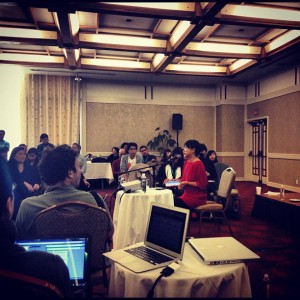
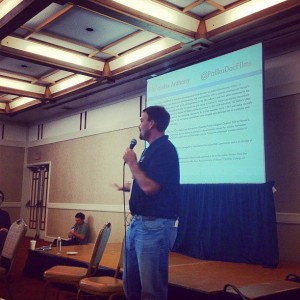
Pictured: (Rana Cho, Na’alehu Anthony) Photos by: Jain Thapa.
See all of the blog posts on Present/Future
Present/Future playlist on our YouTube CAAM Channel




